Related Research Articles

The English Civil War was a series of civil wars and political machinations between Royalists and Parliamentarians in the Kingdom of England from 1642 to 1651. Part of the wider 1639 to 1653 Wars of the Three Kingdoms, the struggle consisted of the First English Civil War and the Second English Civil War. The Anglo-Scottish War of 1650 to 1652 is sometimes referred to as the Third English Civil War.
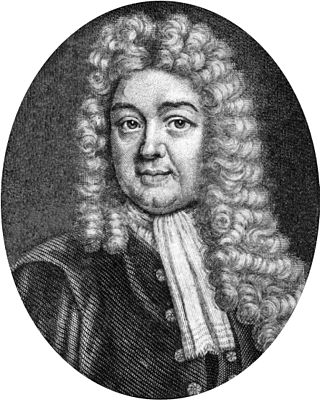
John Radcliffe was an English physician, academic and politician. A number of landmark buildings in Oxford, including the Radcliffe Camera, the Radcliffe Infirmary, the Radcliffe Science Library, Radcliffe Primary Care and the Radcliffe Observatory were named after him. The John Radcliffe Hospital, a large tertiary hospital in Headington, is also named after him.
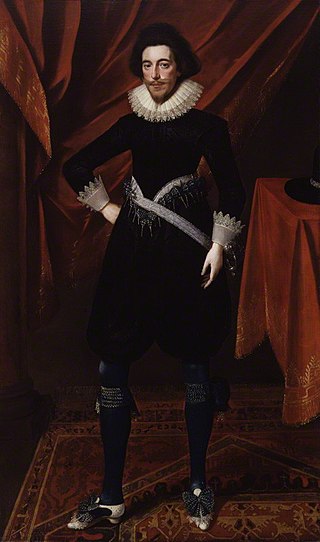
Robert Devereux, 3rd Earl of Essex, KB, PC was an English Parliamentarian and soldier during the first half of the 17th century. With the start of the Civil War in 1642, he became the first Captain-General and Chief Commander of the Parliamentarian army, also known as the Roundheads. However, he was unable and unwilling to score a decisive blow against the Royalist army of King Charles I. He was eventually overshadowed by the ascendancy of Oliver Cromwell and Thomas Fairfax, and resigned his commission in 1646.

The Battle of Naseby took place on 14 June 1645 during the First English Civil War, near the village of Naseby in Northamptonshire. The Parliamentarian New Model Army, commanded by Sir Thomas Fairfax and Oliver Cromwell, destroyed the main Royalist army under Charles I and Prince Rupert. The defeat ended any real hope of royalist victory, although Charles did not finally surrender until May 1646.

Sir Charles Lucas, 1613 to 28 August 1648, was a professional soldier from Essex, who served as a Royalist cavalry leader during the Wars of the Three Kingdoms. Taken prisoner at the end of the First English Civil War in March 1646, he was released after swearing not to fight against Parliament again, an oath he broke when the Second English Civil War began in 1648. As a result, he was executed following his capture at the Siege of Colchester in August 1648, and became a Royalist martyr after the 1660 Stuart Restoration.
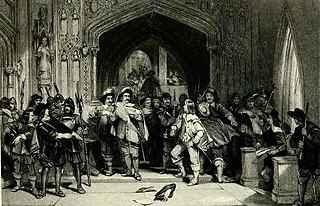
Pride's Purge is the name commonly given to an event that took place on 6 December 1648, when soldiers prevented members of Parliament considered hostile to the New Model Army from entering the House of Commons of England.

Sir William Waller JP was an English soldier and politician, who commanded Parliamentarian armies during the First English Civil War. Elected MP for Andover to the Long Parliament in 1640, Waller relinquished his military positions under the Self-denying Ordinance in 1645. Although deeply religious and a devout Puritan, he belonged to the moderate Presbyterian faction, who opposed the involvement of the New Model Army in politics post 1646. As a result, he was one of the Eleven Members excluded by the army in July 1647, then again by Pride's Purge in December 1648 for refusing to support the Trial of Charles I, and his subsequent execution in January 1649.

The Battle of Alton, of the First English Civil War, took place on 13 December 1643 in the town of Alton, Hampshire, England. There, Parliamentary forces serving under Sir William Waller led a successful surprise attack on a winter garrison of Royalist infantry and cavalry serving under the Earl of Crawford. The Battle of Alton was the first decisive defeat of Sir Ralph Hopton, leader of Royalist forces in the south, and the event had a significant psychological effect on him as commander. More important to Hopton was the loss of men, however, as he was already short-handed in much-needed infantry. The successful Parliamentarians were able, after their victory, to attack and successfully besiege Arundel, a larger and more formidable Royalist outpost to the south-east of Alton.

Colonel John Hewson, also spelt Hughson, was a shoemaker from London and religious Independent who fought for Parliament and the Commonwealth in the Wars of the Three Kingdoms, reaching the rank of colonel. Considered one of Oliver Cromwell's most reliable supporters within the New Model Army, his unit played a prominent part in Pride's Purge of December 1648. Hewson signed the death warrant for the Execution of Charles I in January 1649, for which he reportedly sourced the headsman, while soldiers from his regiment provided security.

Colonel John Birch was a soldier and politician from Manchester in England. He fought for the Parliamentarians in the First English Civil War, and was a Member of Parliament at various times between 1646 and 1691.
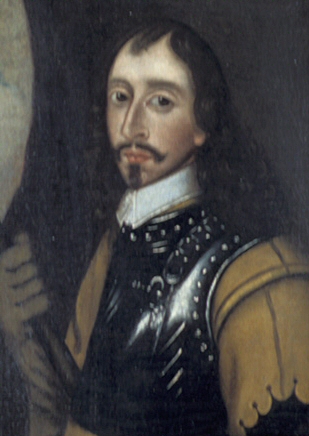
Sir Edward Massey, also spelt Massie, was an English soldier and politician from Cheshire, who sat in the House of Commons at various times between 1646 and 1674. He fought for Parliament in the First English Civil War, when he became famous for his defence of Gloucester. Although he remained loyal during the 1648 Second English Civil War, Massey switched sides following the Execution of Charles I in January 1649, and served under his son Charles II during the Anglo-Scottish war (1650–1652). Badly wounded at Worcester in September 1651, he was captured but managed to escape, and rejoin the exiled Stuart court in the Dutch Republic.
The siege of Reading was an eleven-day blockade of Reading, Berkshire during the First English Civil War. Reading had been garrisoned by 3,000 Royalist troops under Sir Arthur Aston in November 1642. On 14 April 1643, Robert Devereux, 3rd Earl of Essex led a Parliamentarian army of 19,000 troops to lay siege to the town, and began bombarding it two days later.

James Berry, died 9 May 1691, was a Clerk from the West Midlands who served with the Parliamentarian army in the Wars of the Three Kingdoms. Characterised by a contemporary and friend as "one of Cromwell's favourites", during the 1655 to 1657 Rule of the Major-Generals, he was administrator for Herefordshire, Worcestershire, Shropshire and Wales.

The siege of Basing House near Basingstoke in Hampshire, was a Parliamentarian victory late in the First English Civil War. Whereas the title of the event may suggest a single siege, there were in fact three major engagements. John Paulet, 5th Marquess of Winchester owned the House and as a committed Royalist garrisoned it in support of King Charles I, as it commanded the road from London to the west through Salisbury.
Archibald Strachan was a Scottish soldier who fought in the Wars of the Three Kingdoms, reaching the rank of colonel.
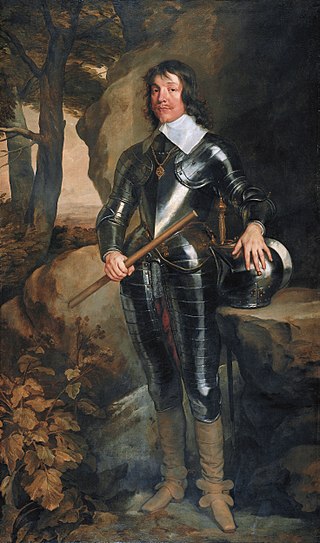
James Hamilton, 1st Duke of Hamilton, KG, PC, known as the 3rd Marquess of Hamilton from March 1625 until April 1643, was a Scottish nobleman and influential political and military leader during the Thirty Years' War and the Wars of the Three Kingdoms.

The Souldiers Pocket Bible was a pamphlet version of the Protestant Bible that was carried by the soldiers of Oliver Cromwell's New Model Army during the English Civil War.
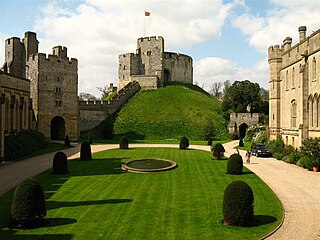
The siege of Arundel took place during the First English Civil War, from 19 December 1643 to 6 January 1644, when a Royalist garrison surrendered to a Parliamentarian army under Sir William Waller.
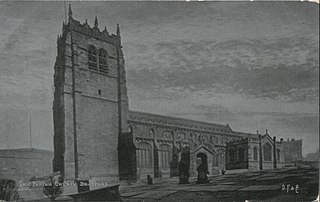
The sieges of Bradford, were two very short-lived sieges that took place separately in the town of Bradford, Yorkshire, in December 1642 and early July 1643, just after the Royalist victories in Pontefract (1642), and the Battle of Adwalton Moor (1643) respectively. In the second siege, with the Parliamentarian forces dispersed to the west in and around Halifax, the Earl of Newcastle subjected Bradford to a brief siege to enforce rule and allegiance to the king.
The Storming of Shelford House was a confrontation of the English Civil War that took place from 1 to 3 November 1645. The Parliamentarian force of Colonel-General Sydnam Poyntz attacked the Royalist outpost of Shelford House, which was one of a group of strongholds defending the strategically important town of Newark-on-Trent. The house, owned by Philip Stanhope, 1st Earl of Chesterfield and controlled by his son Philip Stanhope, and made up of mostly Catholic soldiers, was overwhelmed by the Parliamentarian force after calls for submission were turned down by Stanhope. The majority of the defenders were killed in the resulting sack by the Parliamentarians, commanded by Colonel John Hutchinson, and the house was then burned to the ground. Stanhope died soon afterwards from injuries he sustained in the attack.
References
- ↑ Ian Roy, "Soldiers of Fortune", in The Oxford History of the British Army, edited by David G. Chandler and Ian Beckett (Oxford University Press, 1994), p. 33.
- ↑ Frederick Valletta, Witchcraft, Magic and Superstition in England, 1640–70 (Routledge, 2017).
- ↑ William Thoms, ed., Anecdotes and Traditions Illustrative of Early English History and Literature Derived from MS Sources (London, Camden Society, 1839), pp. 111-113.
- ↑ John Lennard, Of Sex and Faerie: Further Essays on Genre Fiction (2010), p. 315.